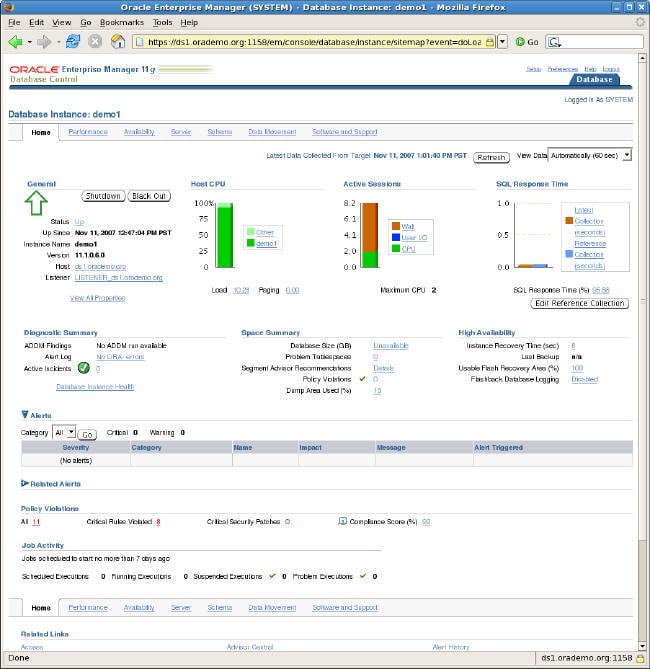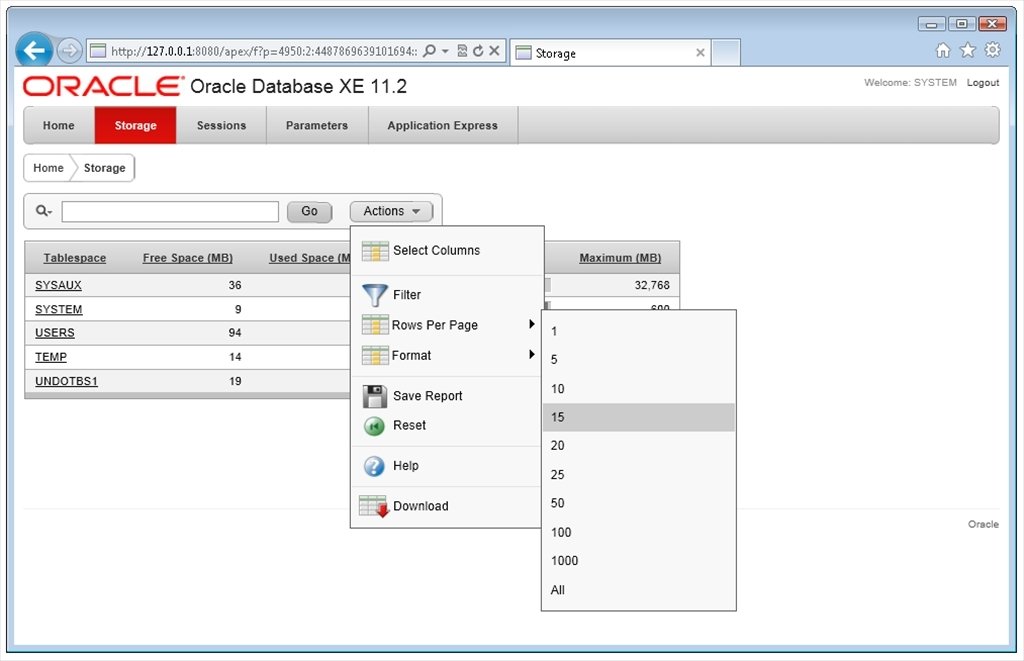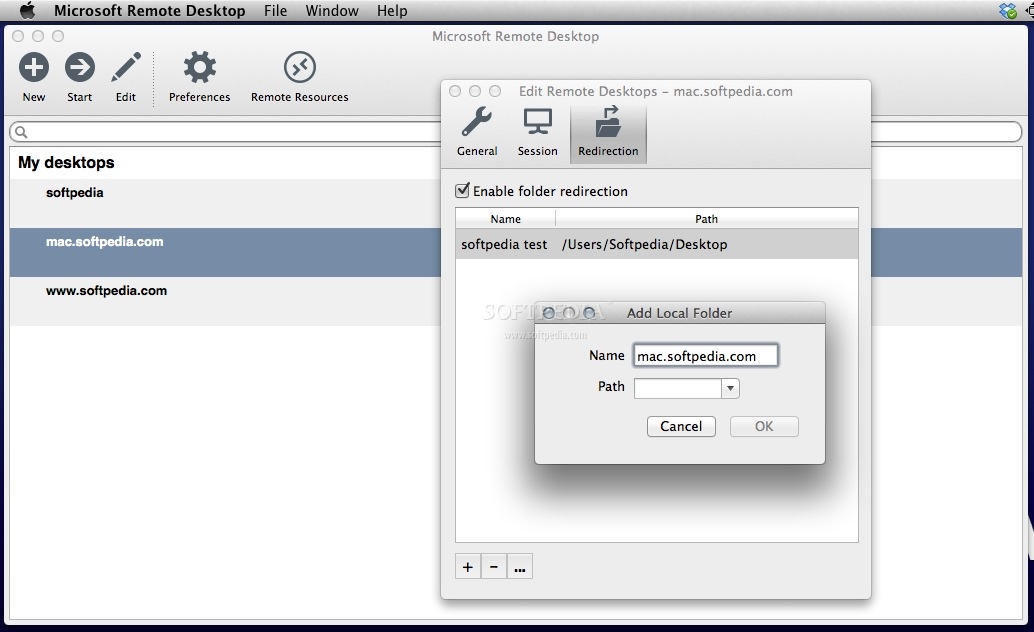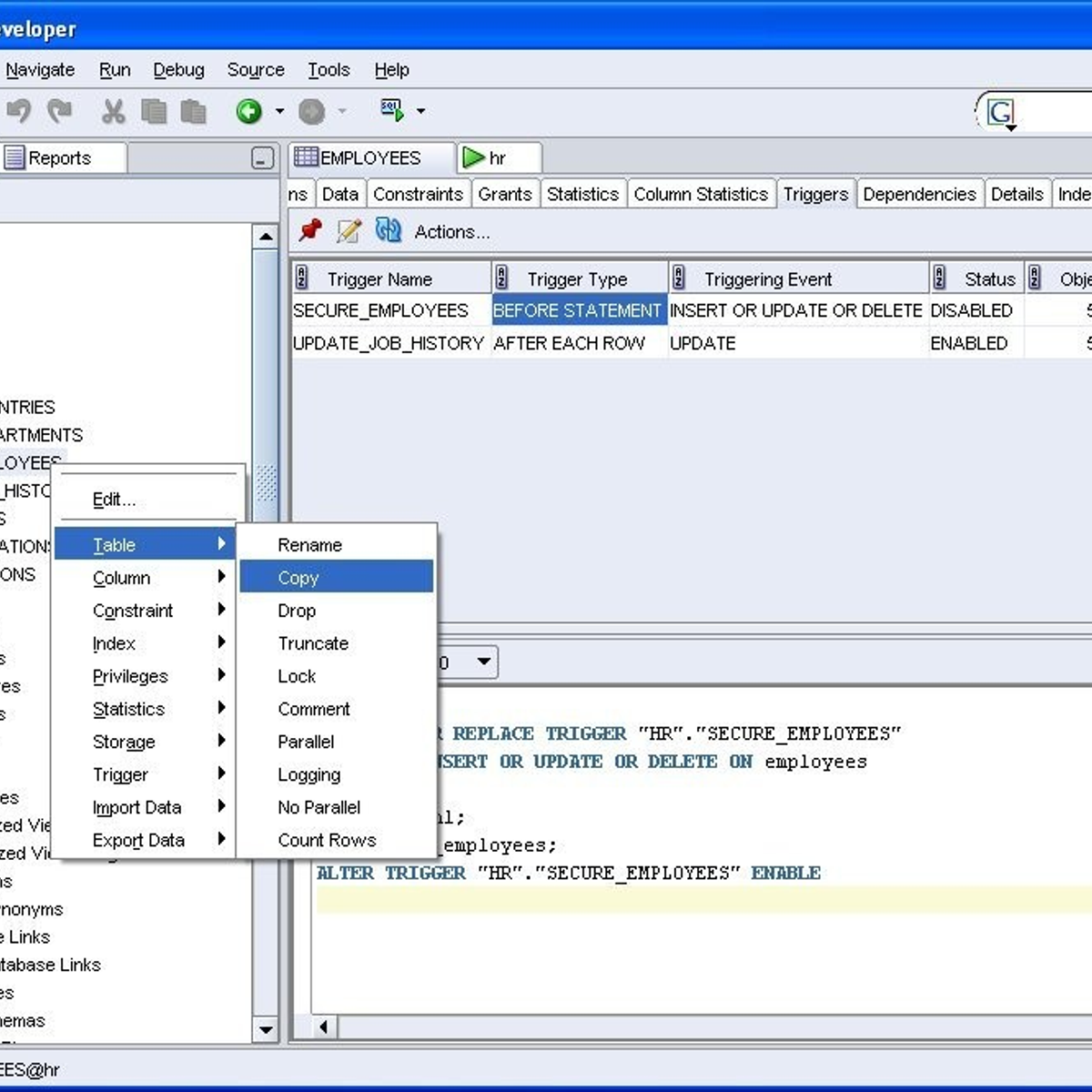Install Oracle Application Express by downloading a ZIP file from the Oracle Application Express download page.
I have searched high and low and can't seem to find any download for Oracle Database 10/11g for Mac OSX. There area pages with links, but all the links are dead or point to the standard oracle downloads.

- For installations where the development will be in English only, download the file
apex_5.1_en.zipfrom the Oracle Application Express download page. If the development will include languages other than English, downloadapex_5.1.zipfrom the Oracle Application Express download page. See:Note that the actual file name may differ if a more recent release has shipped since this document was published.
- Unzip downloaded zip file:
If English only, unzip
apex_5.1_en.zipas follows, preserving directory names:UNIX and Linux:
$ unzip apex_5.1_en.zipWindows: Double click the file
apex_5.1_en.zipin Windows Explorer
If multiple languages, unzip
apex_5.1.zipas follows, preserving directory names:UNIX and Linux:
$ unzipapex_5.1.zipWindows: Double click the file
apex_5.1.zipin Windows Explorer
Note:
Notepad for Mac is a note-taking app for Mac OS X. A trial version is available from several download sites, while the full licensed version of Notepad for. Mac Notepad also called iNotepad for Mac is a text editor that provides a user interface and features focused around technologies unique to Apple devices. Far from being a simple replacement for Microsoft's Notepad Mac Notepad provides powerful and innovative organizational features letting you collect and track hundreds of notes in a single. Atom is manufactured on HTML, JavaScript, CSS, and Node.js integration and works. Simple notepad for mac. Brackets is a free and open-source code editor by Adobe. It is a great Notepad.
You should keep the directory tree where you unzip the files short and not under directories that contain spaces. For example, within Windows unzip to
C:TEMP. - Change your working directory to
apex. - Start SQL*Plus and connect to the database where Oracle Application Express is installed as
SYSspecifying theSYSDBArole. For example: - Disable any existing password complexity rules for the default profile. See “Configuring Password Protection” in Oracle Database Security Guide.
- Select the appropriate installation option.
Full development environment provides complete access to the App Builder environment to develop applications. A Runtime environment enables users to run applications that cannot be modified.
Available installation options include:
Full development environment. Run
apexins.sqlpassing the following four arguments in the order shown:Where:
tablespace_apexis the name of the tablespace for the Oracle Application Express application user.tablespace_filesis the name of the tablespace for the Oracle Application Express files user.tablespace_tempis the name of the temporary tablespace or tablespace group.imagesis the virtual directory for Oracle Application Express images. For installations using EPG,/i/is the required value for the images argument. To support future Oracle Application Express upgrades, define the virtual image directory as/i/.
Example:
Note:
If you receive the following error, exit SQL*Plus and change your working directory to where you unzipped the installation file, for example
C:TEMPin Windows, before starting SQL*Plus:SP2-0310: unable to open file 'apexins.sql'Runtime environment. Run
apxrtins.sqlpassing the following arguments in the order shown:Where:
tablespace_apexis the name of the tablespace for the Oracle Application Express application user.tablespace_filesis the name of the tablespace for the Oracle Application Express files user.tablespace_tempis the name of the temporary tablespace or tablespace group.imagesis the virtual directory for Oracle Application Express images. To support future Oracle Application Express upgrades, define the virtual image directory as/i/.
Example:
- I have searched high and low and can't seem to find any download for Oracle Database 10/11g for Mac OSX. There area pages with links, but all the links are dead or point to the standard oracle downloads with no OSX version.
- How to download Oracle 11g & 12c Database software and create your 1st Oracle Database. In which we explain clearly step by step. (+1) 872-2ORACLE (67-2253) info@fouaddba.com.
When Oracle Application Express installs, it creates three new database accounts:
APEX_050100- The account that owns the Oracle Application Express schema and metadata.FLOWS_FILES- The account that owns the Oracle Application Express uploaded files.APEX_PUBLIC_USER- The minimally privileged account is used for Oracle Application Express configuration with Oracle REST Data Services or Oracle HTTP Server andmod_plsql.


Note:
In an environment where EPG is used to access Oracle Application Express, the existing minimally privileged account ANONYMOUS is used.
If you are upgrading from a previous release, then FLOWS_FILES already exists and APEX_PUBLIC_USER is created if it does not already exist.
Tip:
Oracle Application Express must be installed from a writable directory on the file system. See 'Reviewing a Log of an Installation Session.'
See Also:
'Configuring Password Protection' in Oracle Database Security Guide
'About the Oracle Application Express Runtime Environment'
'SQL*Plus User's Guide and Reference for more information about SQL*Plus'
'Reviewing a Log of an Installation Session'
Oracle JDBC for macOS
This tutorial shows how to set up a data source and connect to an Oracle® database using the Database Explorer app or the command line. This tutorial uses the Oracle Database 11g Release 2 (11.2.0.3) JDBC driver for use with JDK™ 1.6 to connect to an Oracle 11g Enterprise Edition Release 11.2.0.1.0 database.
Step 1. Verify the driver installation.
If the JDBC driver for Oracle is not installed on your computer, find the link on the Driver Installation page to install the driver. Follow the instructions to download and install this driver on your computer.
Step 2. Set up the data source.
You set up a data source using the Database Explorer app or the command line.
Set Up Data Source Using Database Explorer App
Open the Database Explorer app by clicking the Apps tab on the MATLAB® Toolstrip. Then, on the right of the Apps section, click the Show more arrow to open the apps gallery. Under Database Connectivity and Reporting, click Database Explorer. Alternatively, enter
databaseExplorerat the command line.In the Data Source section, select Configure Data Source > Configure JDBC data source.
The JDBC Data Source Configuration dialog box opens.
In the Name box, enter a name for your data source. (This example uses a data source named
ORA.) You use this name to establish a connection to your database.From the Vendor list, select
Oracle.Note
To use the full entry from your
tnsnames.orafile, selectOtherinstead and enter the full entry in the resulting URL box. Then, enter the full path to the JDBC driver file in the Driver Location box and the name of the driver in the resulting Driver box. Save the JDBC data source. For details about these steps, see Other ODBC-Compliant or JDBC-Compliant Databases.In the Driver Location box, enter the full path to the JDBC driver file.
In the Database box, enter the name of your database. In the Server box, enter the name of your database server. Consult your database administrator for the name of your database server.
The name can be the service name or the Oracle system identifier (SID), depending on your specific Oracle database setup. For details, see your
tnsnames.orafile, which is often stored in<ORACLE_HOME>/NETWORK/ADMIN, where<ORACLE_HOME>is the folder containing the installed database or the Oracle client.In the Port Number Open source app to send rts to mac address labels. box, enter the port number. From the Driver Type list, select
thinoroci. (Usethinas the default driver. Useociif you installed an OCI driver.)Under Connection Options, in the Name column, enter the name of an additional driver-specific option. Then, in the Value column, enter the value of the driver-specific option. Click the plus sign to specify additional driver-specific options.
Click . The Test Connection dialog box opens. Enter the user name and password for your database, or leave these boxes blank if your database does not require them. Click .
If your connection succeeds, the Database Explorer dialog box displays a message indicating the connection is successful. Otherwise, it displays an error message.
Click . The JDBC Data Source Configuration dialog box displays a message indicating the data source is saved successfully. Close this dialog box.
Set Up Data Source Using Command Line

Create a JDBC data source for an Oracle database.
Set the JDBC connection options. To set the connection options with an OCI driver, use the
'DriverType'name-value pair argument. For example, this code assumes that you are connecting to a JDBC data source namedORA, full path of the JDBC driver file/home/user/DB_Drivers/ojdbc7.jar, database nametoystore_doc, database serverdbtb05, port number1521, and driver typeoci.To set the connection options without the OCI driver, omit the
'DriverType'name-value pair argument.Test the database connection by specifying the user name
usernameand passwordpwd, or leave these arguments blank if your database does not require them.Save the JDBC data source. Movavi video converter 17 serial key.
After you complete the data source setup, connect to the Oracle database using the Database Explorer app or the JDBC driver and command line.
Step 3. Connect using the Database Explorer app or the command line.
Connect to Oracle Using Database Explorer App
On the Database Explorer tab, in the Connections section, click and select the data source for the connection.
In the connection dialog box, enter a user name and password, or leave these boxes blank if your database does not require them. Click .
The Catalog and Schema dialog box opens.
In the Schema list, select the schema. Click .
The app connects to the database and displays its tables in the Data Browser pane. A data source tab appears to the right of the pane. The title of the data source tab is the data source name that you defined during the setup. The data source tab contains empty SQL Query and Data Preview panes.
Select tables in the Data Browser pane to query the database.
Close the data source tab to close the SQL query. In the Connections section, close the database connection by clicking .
Note
If multiple connections are open, close the database connection of your choice by selecting the corresponding data source from the list.

Connect to Oracle Using JDBC Driver and Command Line
Connect to an Oracle database using the configured JDBC data source, user name
username, and passwordpwd.If you have trouble using the
databasefunction, use the full entry from yourtnsnames.orafile in the URL string as one consecutive line. Leave the first argument blank. For example, this code assumes that the value of the'URL'name-value pair argument is set to the specifiedtnsnames.orafile entry for an Oracle database.Close the database connection.
See Also
Apps
Functions
Oracle 11g Genuine Download For Mac Os
close|configureJDBCDataSource|database|saveAsJDBCDataSource|setConnectionOptions|testConnection